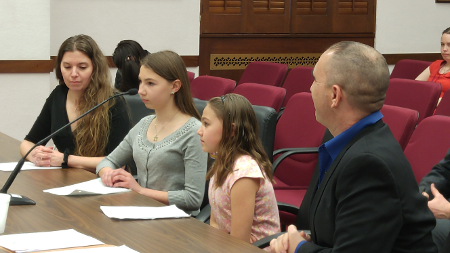By Jeffrey A. Roberts
CFOIC Executive Director
A Jefferson County charter school violated Colorado’s Sunshine Law and retaliated against a family when the parents asked questions about their daughters’ education, a lawsuit claims.
Alex and Joanne McDaniel contend they were compelled to file a legal action against Montessori Peaks Academy to “obtain information that never should have been shielded from the public.” Their April 5 suit asks a district court judge to release documents and recordings related to “invalid” executive sessions and to void any actions taken during those meetings.
More broadly, it asks the judge to declare that the board of Montessori Peaks Academy is bound by the state statute governing public school boards.

The McDaniel family testifies in February on SB 16-101, the school board ethics commission bill (photo courtesy of The Colorado Independent).
That portion of state law sets rules for boards of education to follow in addition to those imposed by the Open Meetings Law, aka the Sunshine Law. For instance, it requires that votes be taken by roll call. And it says that meeting minutes must indicate the topic of executive sessions as well as “the amount of time each topic was discussed while the board was meeting in executive session.”
The McDaniels’ dispute with Montessori Peaks Academy stems from their dissatisfaction with the way the school educated and treated their daughters, who are 12 and 10. The school’s principal and board “conspired to drive” the girls from the school after the McDaniels “started asking questions about the school’s administration,” the lawsuit says.
The McDaniels allege that school officials took “retaliatory actions” against them, including maligning them to other parents and restricting their access to the school and information about their daughters’ academic performance. They also claim the charter school’s board held closed-door meetings regarding their family and other matters in 2015 in violation of the Sunshine Law and the school board statute.
Specifically, they say the board failed to adequately identify the subject of the executive sessions with enough specificity, as required by law. They also claim the board discussed matters not permitted in executive sessions, failed to keep adequate minutes and destroyed executive-session recordings in violation of the law.
“There have been a variety of closed-door sessions that certainly do not meet the letter of the law or the spirit of the law,” Alex McDaniel told state senators in February when the entire family testified in favor of SB 16-101. That bill, which lost in committee, would have created a school board ethics commission to hear complaints about open-meeting violations and other matters.
The Colorado Freedom of Information Coalition tried unsuccessfully to contact William Bethke, the attorney for Montessori Peaks Academy, about the McDaniels’ lawsuit. But the family provided a Dec. 31, 2015, letter from Bethke that addresses several issues later raised in the lawsuit.
The charter school, Bethke wrote, “is not a school district” and, therefore, does not have a board of education that must comply with the statute governing school boards. Although charter schools are local public entities as defined in the Sunshine Law, the additional rules specific to boards of education “do not apply to charters, and never have,” he added.
Because Montessori Peaks never has used electronic recordings as minutes, it isn’t required to continue that practice by law, Bethke wrote. “Once minutes are prepared and adopted the recording is erased. No recording exists of public sessions you identify,” he told the McDaniels’ attorney.
He also contended that board executive sessions were announced with adequate specificity. “No matter how much detail one supplies (or doesn’t), one can always assert that another bit of information would not compromise the executive session,” Bethke wrote. “I describe this statute as apparently requiring boards to walk up to the edge of a cliff, hang their toes over, and lean as far as they possibly can without falling.
“But if the question is ‘reasonable’ protection of the purpose of an executive session, I believe one is allowed to be a step or two away from the cliff’s edge.”
Bethke’s letter claims the “real point” of the McDaniels’ allegations “is not transparency but a campaign of vexatious behavior.
Follow the Colorado Freedom of Information Coalition on Twitter @CoFOIC. Like CFOIC’s Facebook page. Do you appreciate the information and resources provided by CFOIC? Please consider making a tax-deductible donation.




